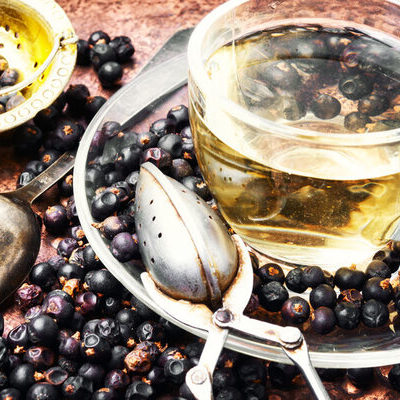
Juniper Berry Tea
What is Juniper Berry Tea?
Juniper berry tea is a hot beverage made from brewing common juniper berries (Juniperus communis L.) in hot water. When brewed, juniper berry tea gives off sharp, piney, and even peppery flavors. Juniper berries are not technically berries, but rather they are the seed of the juniper tree and are classified as a spice.
- These berries have been used since ancient times for medicinal purposes.
- Juniper berries are also commonly used to flavor gin, a type of liquor that sold 9.76 million 9 liter cases in the US in 2019.
Some common ways to use juniper berries include:
- Teas
- Casseroles
- Marinades
- Spice Rubs
- Stuffings
- Cakes
- Gin
Origin
The first mention of juniper berries dates back to Egypt in 1500 BCE, where this spice was used to cure people of tapeworms. The ancient Greeks were also known to use this berry in purification ceremonies, as well as to increase physical endurance in athletes. Furthermore, the ancient Romans famously used juniper berries to treat stomach ailments and flatulence. Evidence shows that this berry was even used in Traditional Chinese Medicine (TCM) to flush out toxins from the kidneys and bladder.
It was later, in the 17th century, that juniper berry began to be used as a flavoring and food in the Netherlands. Juniper berries were used to flavor “gin”, a name which is believed to have originated from the Dutch word “jenever” meaning juniper. The popularity of this beverage led to the creation of other juniper berry beverages and dishes in Europe. Today, juniper berries are used in many cuisines, such as Norwegian, Swedish, German, Austrian, Hungarian, Czech, and Polish. While this berry tea is less popular than gin made from this spice, it remains well-known for its medicinal properties.
Nutrition
One serving (355mL) of juniper berry tea contains:

Juniper berry tea can provide plenty of vitamins and plant compounds, such as Vitamin C, flavonoid antioxidants, monoterpenes, and coumarins. Studies have shown that monoterpenes can provide anti-inflammatory, antioxidant, antibacterial, and even anti-cancer properties. Some other health benefits of juniper berries include possible anti-diabetic properties, improved heart health, and antimicrobial properties. However, juniper berry tea may not be suitable for everyone as it can be diuretic. Furthermore, juniper berries encourage the contraction of smooth muscles and should not be consumed by women who are pregnant or breastfeeding.
Commercial Production
The commercial production first begins with collecting juniper berries. Then, the plant material is transported to a factory for sorting, washing, and disinfecting. Next, the berries are dried and can be mixed with other spices to create special blends before they are packaged. If the juniper berry tea is distributed in tea bags, there is an additional step of grinding which happens before packaging. Finally, the tea is shipped off for distribution.
Uses
Juniper berry tea is known for its peppery flavor and fragrant smell. However, to enjoy this tea to the maximum, you should ensure that the berries are properly stored. When storing the fresh juniper berries, you should keep them in an airtight container away from light and heat. You can also dry these berries for long-term storage using a dehydrator or air drying methods to ensure you can enjoy juniper berry tea all year round. Dried juniper berries should also be stored in an airtight container in a cool, dark place.
Juniper berry tea recipes
These berries can be enjoyed in many ways. Here are some popular recipes:
- Juniper Berry Tea
- Juniper Berry Tea Syrup
- Rosemary and Orange Juniper Syrup
- Juniper Berry Citrus Gin Fizz Cocktail
- Fermented Juniper Berry Juice (Smreka)
FDA Regulation
The Food & Drug Administration classifies juniper berries (Juniperus communis L.) as a substance that is generally considered safe and can be used for essential oils, oleoresins, and natural extractives. Although one of the other varieties of this berry, known as Juniperus sabina, is listed on the FDA’s Poisonous Plant Database, making this variety unsafe to use. The FDA also regulates the polymers most commonly used in tea bags or infusers. However, the other aspects of herbal tea production, such as importation and packaging, are strictly regulated by the USDA. Furthermore, the USDA also regulates instant tea mixes.
References
“Juniper Berry Benefits & Information.” Indigo Herbs, Indigo Herbs Ltd., www.indigo-herbs.co.uk/natural-health-guide/benefits/juniper-berry.
Conway, Jan. “U.S. Sales Volume of Gin 2019.” Statista, Statista, 4 Sept. 2020, www.statista.com/statistics/325941/us-sales-volume-of-gin/.
Christiansen, Sherry. “The Health Benefits of Juniper Berries.” Verywell Health, About, Inc., 10 May 2020, www.verywellhealth.com/juniper-berry-benefits-4589326.
“Juniper Berry Facts for Kids.” Kiddle, Kiddle Encyclopedia, 14 Sept. 2020, kids.kiddle.co/Juniper_berry.
“CFR – Code of Federal Regulations Title 21.” Accessdata.fda.gov, U.S. Food & Drug Administration, 1 Apr. 2019, www.accessdata.fda.gov/scripts/cdrh/cfdocs/cfcfr/cfrsearch.cfm?fr=182.20.
